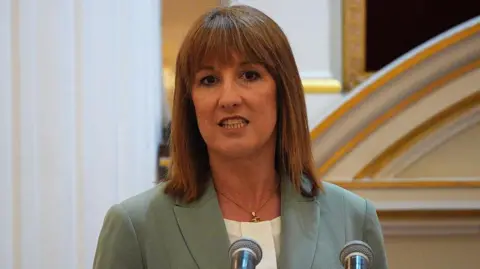In a recent analysis, the International Monetary Fund (IMF) has recommended significant changes regarding how the UK’s government finances are evaluated. Currently, the Office for Budget Responsibility (OBR), which serves as the independent forecaster for the UK government, is tasked with producing two economic forecasts every year. The IMF’s suggestion is to streamline this process by limiting assessments to once per year in order to mitigate the effects of “overly frequent” policy shifts.
The necessity for this change comes in the wake of economic volatility caused by fluctuations in borrowing rates, both domestically and globally. Recently, the Chancellor of the Exchequer, Rachel Reeves, announced a £5 billion reduction in health-related welfare spending, a decision influenced by revised forecasts from the OBR. However, this decision faced backlash, leading to its eventual reversal due to a revolt among Labour backbench MPs.
The IMF’s expertise in global finance provides weight to its suggestion that the UK government should grant itself additional flexibility regarding financial targets. By doing so, the IMF argues that the government could make small adjustments to its economic outlook without compromising the integrity of its fiscal assessments. This flexibility could prove critical in enhancing the UK’s capacity to adapt to economic shocks.
One potential outcome of adopting the IMF’s recommendation could be an increase in taxes announced during the upcoming Budget this Autumn. The Chancellor is expected to fortify the government’s financial buffer in response to an unpredictable global economy. The idea is to promote greater policy stability, which is also aligned with the government’s objective to consolidate its budgetary practices under a single annual upfront assessment.
In correlation with the IMF’s position, the Institute for Fiscal Studies (IFS) has also advocated for a refined approach, recommending a more lenient borrowing target to minimize the need for continual adjustments in tax and spending frameworks.
The Chancellor currently operates based on two essential financial rules that she deems non-negotiable. These rules dictate that the UK must cover day-to-day operational costs through tax revenue rather than debt. Furthermore, she emphasizes that the national debt must be on a clear downward trajectory as a proportion of the country’s income by the end of the parliamentary period in 2029-2030.
Despite the pressures and challenges, the IMF lauded the UK for its economic resilience and commended its recent reforms aimed at stimulating growth. The organization noted that the UK’s medium-term borrowing objectives were reasonable and that its trade agreements placed it in a favorable position to navigate existing global uncertainties and potential economic disruptions.
In the event that economic setbacks do occur, the IMF advised that the UK government should contemplate various structural reforms. These might include evaluating the state pension triple lock, broadening the application of Value Added Tax (VAT), introducing means testing for certain benefits, and establishing copayment systems for higher-income users of the National Health Service (NHS).
Chancellor Rachel Reeves responded positively to the IMF’s assessment, asserting that the government’s decisions have laid a solid foundation for economic recovery. She expressed confidence in the government’s strategy to resolve entrenched economic issues that the current administration has inherited, particularly in the context of enduring global economic turbulence. Reeves emphasized that the fiscal framework in place is designed to enable proactive investment in the renewal of Britain’s economy, thus positioning it to face its economic challenges more effectively.
Overall, the IMF’s recommendations could initiate a vital shift in how the UK government approaches its fiscal strategy, potentially paving the way for a more sustainable and stable economic future.












